|
|
|
Sort Order |
|
|
|
Items / Page
|
|
|
|
|
|
|
| Srl | Item |
| 1 |
ID:
184241


|
|
|
|
|
| Summary/Abstract |
COVID-19 has triggered deep economic damage and devastated livelihoods to an extent never before experienced. It has revealed socio-economic vulnerabilities and so can be used as a learning platform in preparing for future shocks. In particular, it has exposed the vulnerability of households to sudden, severe, and prolonged income shock, the significance of social security as a shock response tool, and the importance of household resilience for macroeconomic stability. This study uses the pandemic as an opportunity to understand the resilience of Fijian households to profound and prolonged income shocks, given these households’ social, cultural, and economic setting. It evaluates national response strategies, household coping mechanisms, and gaps in the current social security measures in Fiji. This evaluation reveals several key lessons for a systematic response to any future shocks. The lessons may prove beneficial not only for Fiji, but also for other similar economies in the region. Policy makers can build on the operational learning and capacity developed during the pandemic, reinforce existing social security systems, and be better prepared for future income shocks. Fiji and other Pacific Island economies are highly vulnerable to climate-related risks and have endured the adverse economic effects of some extremely intense natural disasters. It is important for these economies to strengthen household resilience and develop sustainable and broad-based programs for social protection.
|
|
|
|
|
|
|
|
|
|
|
|
|
|
|
|
| 2 |
ID:
174422


|
|
|
|
|
| Summary/Abstract |
The informal sector and informal employment relations occupy a prominent place in India's economy: one of their key features is the apparent absence of the state from labour regulation. This article seeks to trace the emergence of the division between the formal and informal sectors in India's economy from a historical perspective: it shows how the state, far from being absent, played a fundamental role in creating the dichotomy. This is done through a close study of labour legislation and the politics around it, taking South India as a case study. The article examines the enactment of four laws in Madras province in the late 1940s, ostensibly aimed at protecting workers, and their subsequent implementation by the Madras government. It shows how these laws ended by excluding workers from small unorganized industries (such as beedi-making, arecanut-processing, handloom-weaving, and tanning) from legal protection. It explores the ramifications of this exclusion and argues that the reinforcement of the formal–informal divide was the outcome of a complex political struggle between employers, workers' unions, and the state during this formative period.
|
|
|
|
|
|
|
|
|
|
|
|
|
|
|
|
| 3 |
ID:
064863
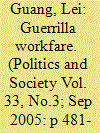

|
|
|
| 4 |
ID:
149763
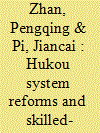

|
|
|
|
|
| Summary/Abstract |
In China, rural migrant workers usually cannot get fair treatment due to the hukou system. This paper investigates how hukou system reforms affect the skilled-unskilled wage inequality through the general equilibrium approach. In the basic model, we find that an increase in the strength of hukou system reforms will narrow down the wage inequality if the urban skilled sector is more capital intensive than the urban unskilled sector. In addition, we separately extend the basic model by introducing the endogenous minimum wage and an informal sector, and find that in these two extended cases the main results of the basic model will conditionally or unconditionally hold. When we consider some empirical evidences in China, our models predict that an increase in the strength of hukou system reforms will reduce the wage inequality.
|
|
|
|
|
|
|
|
|
|
|
|
|
|
|
|
| 5 |
ID:
188684
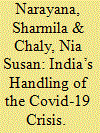

|
|
|
|
|
| Summary/Abstract |
Covid-19 exposed the fragility and inadequacies in India’s health care system, especially in its public health services. The sudden lockdown imposed during the first wave of the virus severely impacted the livelihoods of millions of migrant workers. Then, in spite of warnings about an impending second wave of infection, the government’s failure to prepare the health infrastructure, together with delays in vaccine distribution, cost the lives of hundreds of thousands of people. Unlike the first wave of infection, the second wave impacted rural India very badly. Taking into consideration the existing social hierarchies and inequalities, it was marginalised groups of the population who bore the brunt of the pandemic. This article analyses the failures of the Indian government in handling the Covid-19 crisis, especially during the second wave, and concludes by suggesting ways in which the state needs to intervene to avert disasters of this kind in the future. It argues for the adoption of a ‘rights-based’ approach to public health on the grounds that successive governments have not been properly held to account for their long-term failures to address the issue.
|
|
|
|
|
|
|
|
|
|
|
|
|
|
|
|
| 6 |
ID:
148504


|
|
|
|
|
| Summary/Abstract |
The purpose of this article is to deepen the understanding of informality, and related efforts governments must take to cope with large and persistent informal sectors. Is the informal sector a source of growth and employment or a drain on the fiscus that undermines social safety nets? This article questions the ‘formal sector bias’ present in much of the policy discussions surrounding informality. A theoretically grounded distinction between ‘functional’ and ‘juridical’ informality is drawn and applied to subcontracting as an illustrative case. The broad conclusion of the paper is not supportive of public intervention to formalise the informal sector but rather suggests that tolerating the informal sector might well improve economic performance as measured by output and employment.
|
|
|
|
|
|
|
|
|
|
|
|
|
|
|
|
| 7 |
ID:
190830


|
|
|
|
|
| Summary/Abstract |
The purpose of this study is to investigate the bilateral relationship among formal, informal and foreign direct investment (FDI) in the case of Sri Lanka during the period from 1990 to 2019. Using annual time series data, the Two Stage Least Square method is employed to investigate the relationship among the endogenous variables. The results derived from the analysis suggest that the integration between formal and informal sectors and formal sector and FDI are positive and have significant impacts on each other. However, the negative and significant impacts of the informal sector and FDI on each other further suggest that the integration between the informal sector and FDI did not give an optimistic signal to the country to contemplate that the informal sector is supporting foreign investors. At the same time, a sign that FDI discourages informal sector progression in the results has triggered the attention of further investigations on whether foreign investment agglomeration in Sri Lanka promotes informal-formal sectoral transformation at the cost of the informal sector. However, this study proposes an interest in sound policy requirements to reshape the informal sector towards the interest of foreign direct investors and informal-formal sector transformation.
|
|
|
|
|
|
|
|
|
|
|
|
|
|
|
|
| 8 |
ID:
143533
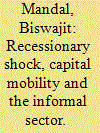

|
|
|
|
|
| Summary/Abstract |
Using the hybrid of Heckscher–Ohlin and Specific Factor models of trade, we show that the economic recession led to shock results for both capitalists and skilled workers. Some of the unionized unskilled workers lose formal sector employment and move onto the informal sector. When capital moves from the formal to the informal segments, both informal employment and wage can go up in latter’s segment. If capital does not move, informal employment expands and wage drops. Thus, recession may have actually benefitted a large number of informal workers.
|
|
|
|
|
|
|
|
|
|
|
|
|
|
|
|
| 9 |
ID:
165765


|
|
|
|
|
| Summary/Abstract |
This article uses the case of illegal street vending in Harare to explore the interface between urban governance and politics. Drawing on the ideas of urban governance and informal governance, it illustrates how polarisation between the opposition political party Movement for Democratic Change-dominated municipal council and the Zimbabwe African National Union Patriotic Front-led government is affecting governance in general and in particular Harare municipality’s ability to handle the illegal street vending problem. While the paper essentially identifies political expediency as the major reason why a lasting solution is elusive in handling the illegal street vending problem, it acknowledges that there are broad reasons for its persistence. Consequently, the article demonstrates some of the reasons why illegal street vending is difficult to end using the conventional methods and provides some alternatives.
|
|
|
|
|
|
|
|
|
|
|
|
|
|
|
|
| 10 |
ID:
155799
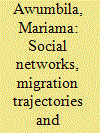

|
|
|
|
|
| Summary/Abstract |
Recent studies indicate that poor migrants are more likely to depend on social capital among other resources for livelihoods in host communities. Relying on insights from the social networks theory and using qualitative data from two migrant sending regions and one migrant destination area in Ghana, this paper examines the role and effects of networks of social capital on migration processes and livelihood strategies of migrants in the construction and domestic work sectors in Accra, Ghana. The paper argues that different categories of migrants fashion out specific migration strategies based on a complex intersection of social networks, which is shaped by specific contexts. Therefore the various ways in which migrants access, maintain and construct different types of networks in varied social locations and with diverse people needs to be interrogated in a more nuanced way and their policy implications addressed.
|
|
|
|
|
|
|
|
|
|
|
|
|
|
|
|
|
|
|
|
|